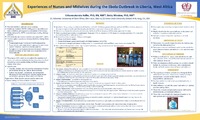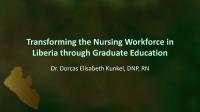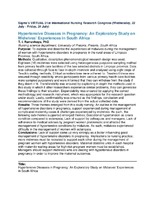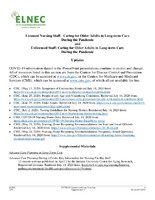| dc.contributor.author | Kollie, Erhuvwukorotu Siemuri | en |
| dc.contributor.author | Winslow, Betty J. | en |
| dc.date.accessioned | 2016-07-13T11:05:15Z | |
| dc.date.available | 2016-07-13T11:05:15Z | |
| dc.date.issued | 2016-07-13 | |
| dc.date.issued | 2016-07-13 | |
| dc.identifier | INRC16PST53 | |
| dc.identifier.uri | http://hdl.handle.net/10755/616135 | |
| dc.description | <p>Theme: Leading Global Research: Advancing Practice, Advocacy, and Policy</p> | en |
| dc.description.abstract | <p>Session presented on Thursday, July 21, 2016 and Friday, July 22, 2016:</p>
<p><strong>Purpose:</strong> The purpose of this study is to describe, analyze, and interpret the experiences of nurses and midwives, including personal, political, institutional, and governmental influences, and perceptions and attitudes towards rendering care to patients during the Ebola outbreak in Liberia, West Africa.</p>
<p><strong>Methods:</strong> The Grounded Theory method will be used in this study. This study will combine both the Corbin and Strauss (2015) and the Charmaz (2014) methods of analysis, which will result in conceptual ordering. A sample size of 30 nurses and midwives will be used to achieve concept saturation. Data will be collected mainly through face-to-face semi-structured tape-recorded interviews. An interview guide will be used to guide the interviews.</p>
<p><strong>Results:</strong> The conceptual ordering will offer a framework for explaining nurses' and midwives' experiences and behavior during Ebola outbreak in Liberia. This study will include a description and interpretation of the experiences of nurses and midwives who continued to care for both Ebola and non-Ebola patients during the Ebola outbreak, thereby showcasing their contributions and reasons for continuing care in the face of grave danger. The outcome of this analysis will provide a model that will illustrate a conceptual ordering of the process of deciding to provide care during the Ebola outbreak. The findings will be informative for practice, policy decisions, and education and curriculum development of nurses and midwives on disease outbreak management. The global implications of the findings of this study may also lead to further research on Ebola outbreak management in the studied location and other locations with similar contextual or socio-cultural conditions.</p>
<p><strong>Conclusion:</strong> The recent Ebola outbreak in the West African region has resulted in many deaths including devastating health, and socioeconomic upheaval (WHO, 2015). The willingness of health care workers (HCWs), including nurses and midwives to respond in fearful situations of uncertainty and insecurity, their perceptions, and attitudes towards their roles during disease outbreaks, influence their availability and positive response to the need for containment of the disease (Barnett et al., 2012; Devnani, 2012; Baster, Edwards, & Schulte, 2009). During the peak of a disease outbreak frontline health care workers who have to be in very close contact with victims of the outbreak, especially virulent diseases that are of high risk to HCWs, were found to have a high unwillingness rate (Barnett et al., 2012; Baster, Edwards, & Schulte, 2009). The symptoms of Ebola virus disease are precarious, the outbreak in West Africa led to raised anxiety levels of health care workers, such that every patient who went for treatment or other services for other health conditions were suspected cases (Hayter, 2015). Despite what is known about HCWs willingness to care in other disease outbreaks, research on the willingness of HCWs, including nurses and midwives to care for victims of Ebola has not yet received much attention. The inner experiences of HCWs combating Ebola in a region that had never experienced such an epidemic is not yet understood.</p> | en |
| dc.format | Text-based Document | en |
| dc.language.iso | en | en |
| dc.subject | Ebola | en |
| dc.subject | Disease Outbreak | en |
| dc.subject | Nursing Care | en |
| dc.title | Experiences of nurses and midwives during the Ebola outbreak in Liberia, West Africa | en |
| dc.type | Poster | en |
| dc.rights.holder | <p>
All rights reserved by the author(s) and/or publisher(s) listed in this item record unless relinquished in whole or part by a rights notation or a Creative Commons License present in this item record.
</p><p>
All permission requests should be directed accordingly and not to the Sigma Repository.
</p><p>
All submitting authors or publishers have affirmed that when using material in their work where they do not own copyright, they have obtained permission of the copyright holder prior to submission and the rights holder has been acknowledged as necessary.
</p> | en |
| dc.description.note | <p>Items submitted to a conference/event were evaluated/peer-reviewed at the time of abstract submission to the event. No other peer-review was provided prior to submission to the Henderson Repository.</p> | |
| dc.type.category | Full-text | en |
| dc.evidence.level | Grounded Theory | en |
| dc.research.approach | Qualitative Research | en |
| dc.contributor.department | Chi Omicron at-Large | en |
| dc.author.details | Erhuvwukorotu Siemuri Kollie, RN, RM; Betty J. Winslow, RN | en |
| dc.conference.name | 27th international Nursing Research Congress | en |
| dc.conference.host | Sigma Theta Tau International | en |
| dc.conference.location | Cape Town, South Africa | en |
| dc.date.conferenceyear | 2016 | |
| dc.description.reviewtype | Abstract Review Only: Reviewed by Event Host | en |
| dc.description.acquisition | Proxy-submission | en |





